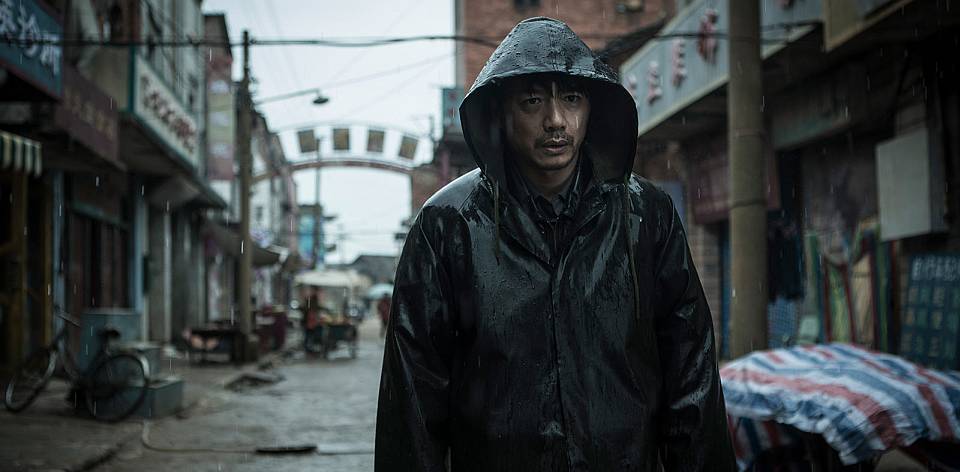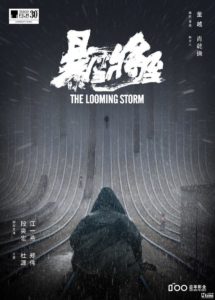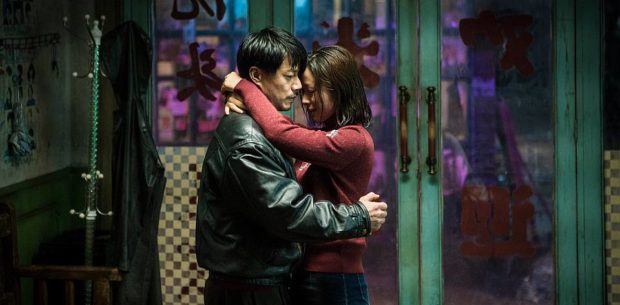The rain in frame falls mainly on working class pain in Yue Dong’s debut THE LOOMING STORM (暴雪将至). The cinematographer turned director quite literally drenches his mystery with noir trappings, one that is set against an industrial landscape of China’s socioeconomic changes over the last two decades. The core story is a gripping one, even if the filmmaker doesn’t quite stick the landing.
We first meet Yu Guowei (Duan Yihong) in 2008, emerging from prison after a 10 year stretch in prison. Most of the film is set in 1997, but it’s probably no mistake that Yue Dong chose this year to start his film. It was a year in which China hosted the Olympics, but also showed the first signs of succumbing to the global financial crisis. At this crossroads, factory worker Yu is already a remnant of a different era, a point hammered home when he spells his name out to the prison official as “remnants” of a “glorious nation.”
Back in 1997, Yu is a security guard for his particular factory. In between catching local crooks, he fancies himself something of a sleuth. So when the latest serial murder occurs, Yu takes it upon himself to solve the case. Here the film takes on the energy of a traditional neo-noir thriller, as a rain-pelted Yu chases a suspect through an industrial wasteland in a sequence that is moody, eerily shot, and tense. Yet a sudden twist later, the film takes on a different energy and follows an alternate path for the remainder.
As additional information comes to light, there’s a surreal glow around the edges of the film. Although set in the 1990s, there’s a 1950s feel to many of the settings. Within this bubble, two additions to the narrative begin to question the reliability of what we have seen to this point. There’s Yanzi (Jiang Yiyun), a prostitute that Yu becomes attracted to. After funding her to open up a legitimate beauty parlour, we hear of her dreams to move to Hong Kong with Yu. Despite appearances, we also learn that they have done little beyond slow dance. As his fondness turns to spying, the other thing we realise is that Yu’s version of reality is slowly disintegrating, which makes his point of view unreliable.
As a cinematographer, Yue Dong’s previous work includes Wang Zhi’s The Journey Away (2009) and like many of his contemporaries, honed his craft in the world of advertising. So it’s no surprise that there’s a perfect symmetry to many of the shots in this film. Take, for example, a scene in which Yu receives a Model Worker award at the factory. The rows of people and ornate bunting are evenly spaces and vividly shot. Given that much of the film carries a desaturated palette, this makes the speech he seems to be giving about living “a meaningful life” all the more otherworldly. At other times, the camera seems to glide through a rail yard that’s (unsurprisingly) being pounded with rain.
While THE LOOMING STORM has been frequently compared to Memories of Murder, it still manages to march to its own beat. The ending gets a little muddy – not surprising given the sheer amount of water – and this undercuts some of the tension Yue Dong has carefully spent his time building. Nevertheless, it still leaves us with an air of mystery, and what could be more noir than that?
 2017 | China | DIRECTOR: Yue Dong | WRITERS: Yue Dong | CAST: Duan Yihong, Jiang Yiyun, Du Yuan | DISTRIBUTOR: Century Fortune Pictures, New York Asian Film Festival (US) | RUNNING TIME: 120 minutes | RELEASE DATE: 8 July 2018 (NYAFF)
2017 | China | DIRECTOR: Yue Dong | WRITERS: Yue Dong | CAST: Duan Yihong, Jiang Yiyun, Du Yuan | DISTRIBUTOR: Century Fortune Pictures, New York Asian Film Festival (US) | RUNNING TIME: 120 minutes | RELEASE DATE: 8 July 2018 (NYAFF)






